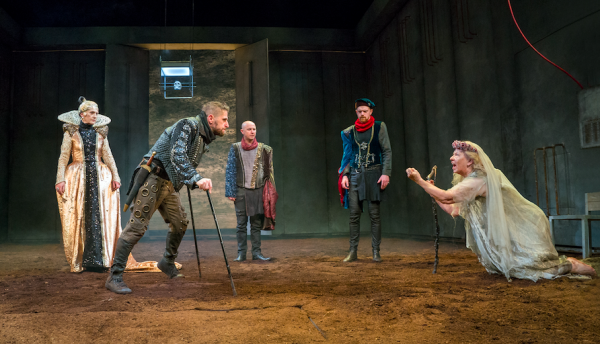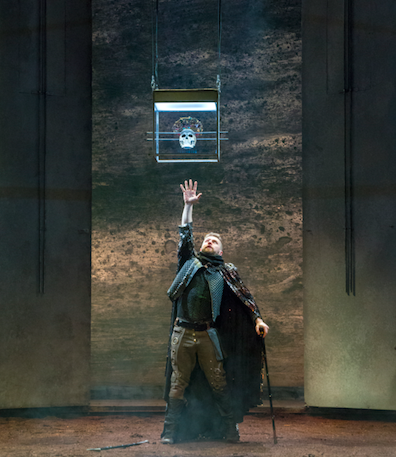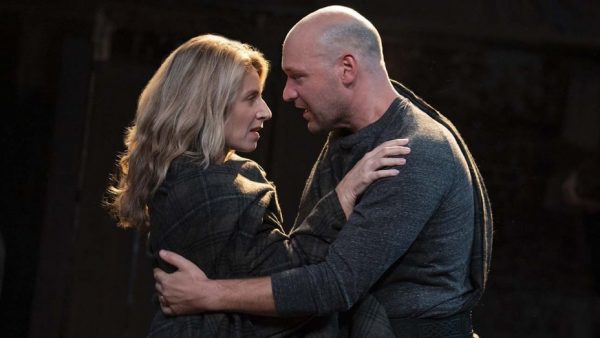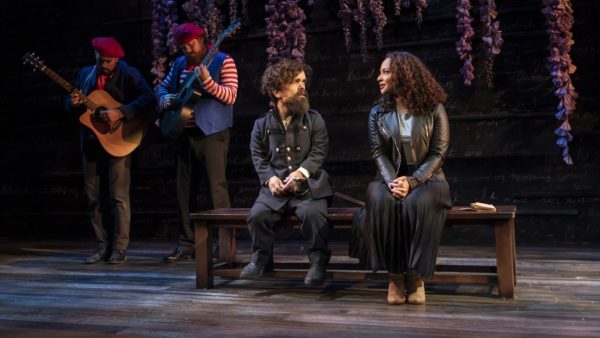A trio of the most iconic and sought-after male title roles in world theater are currently being tackled Off-Broadway in a variety of productions ranging from wickedly sublime to well-intentioned but wrongheaded. The Irish company DruidShakespeare sets the Bard’s Richard III in a comic abattoir while CSC offers a tepid Macbeth and The New Group musicalizes Cyrano with lukewarm results.
Presented as part of Lincoln Center’s White Light Festival, this Richard III is a howlingly funny horror show presided over by a Joker-ish, sexy usurper played with giggling menace by Aaron Monaghan.

Credit: Richard Termine
Shakespeare’s most popular villain, Richard murders and lies his way to the English throne, confiding to the audience his blatant treachery and mendacity. The play is a popular choice for actors eager to dig their teeth into such a juicy role. Plus it’s especially relevant now as Richard revels in spreading “fake news” about his rivals whom he sees as nothing more than impediments to his absolute power grab, not unlike a certain occupant of the White House. Director Garry Hynes, the first woman to win a Directing Tony Award (for The Beauty Queen of Leenane), cleverly takes a description of the England Richard has made as a slaughterhouse, and uses it as the main metaphor of her savage production. Set designer Francis O’Connor transforms the intimate Gerald W. Lynch auditorium at John Jay College into a place of butchery where victims are dispatched with an electric stun gun to the temple. In weird contrast, O’Connor’s costumes are gaudy and ornate, so the royal characters resemble elaborately dressed dolls dropped into a barnyard of death. A plastic cube containing a skull with a crown is suspended high above the earthly proceedings as a symbol of power and mortality.

Credit: Richard Termine
We first meet Richard as he crawls out of a pit and figuratively grabs us by the lapels, mocking the gullibility of his victims and getting us to laugh along with him. Monaghan is strikingly sexy and charismatic even as he twists his body to convey Richard’s physical deformities. For once, the villain’s seduction of Lady Anne, whose husband and father-in-law have been murdered by Richard, actually makes sense. He is a convincing charmer here rather than a hissable cad playing to the audience. In addition, Hynes and O’Connor have Anne (a feisty Siobhan Cullen) dragging the corpse of the late king in the folds of her long gown. Monaghan literally relieves her of her burden by untying the gown and taking up the body himself—only to later dump it in the same hole from which he emerged. This innovative and fresh take on a familiar exchange is emblematic of Hynes’ daring and different Richard. Kudos also to Marie Mullen’s venomous Queen Margaret, Jane Brennan’s brittle Queen Elizabeth, and Rory Nolan’s sneering Buckingham.

Credit: Joan Marcus
Macbeth is regarded as just as juicy a role as Richard and even more complex since he transforms from a fairly decent sort into a tyrannous monster, set on either by his own demons or the supernatural forces represented by the three witches, depending on your interpretation. Classic Stage Company’s bare-bones production, staged by the company’s artistic director John Doyle, fails to strike any fires. This is something of a surprise since Doyle has created many stirring renditions of both plays and musicals in London, on and Off-Broadway, with minimal sets and props. On a bare stage, a small ensemble plays all the roles—they chant the witches’ lines together—racing through the Bard’s dark tale as if their goal was to reach the end rather than convey Shakesepeare’s themes of overweaning ambition. A “spooky” Halloween atmosphere prevails instead of a genuine milieu of fear and dread. During suspenseful sequences, the cast hums what sounds like a macabre version of “Danny Boy” like a pack of students in a high-school haunted house.
Corey Stoll’s Thane starts off blandly and then turns petulant rather than sinister. He comes across as a spoiled teenager rather than a despotic tyrant. There is no sizzle between him and his Lady Macbeth, a tepid Nadia Bowers even though the actors are married in real life. Raffia Bar Soumian’s Malcolm and Barzin Akhavan’s Macduff lacks power and drive. At least Mary Beth Peil provides weight as a dignified Duncan.
Edmond Rostand’s Cyrano de Bergerac is another cherished role often attempted by top stars. Like the CSC Macbeth, the New Group’s musical version of the classic romance of the large-nosed poet-swordsman and his frustrated love for the beautiful Roxanne, is mildly entertaining but passionless.

Credit: Monique Carboni
Previous attempts to musicalize Cyrano have not been successful. A 1973 tuner did win a Tony for Christopher Plummer but ran only a month and has disappeared without a trace. So has a 1993 Dutch adaptation which cropped up briefly on Broadway and featured simplistic staging and execrable lyrics (“Cyrano’s tremendous fun/Tremendous fun for every nun!”). This version, adapted and directed by Erica Schmidt and abbreviated to just Cyrano, drains the work of Rostand’s poetry and leaves routine melodrama in its place.
Peter Dinklage of Game of Thrones fame plays the title hero without a false enormous proboscis and we are meant to substitute the actor’s dwarfism for the missing nose as the cause of Cyrano’s anguish and his excuse for denying his love for Roxanne and writing love letters under the name of the more conventionally handsome Christian. (Dinklage’s height is never referred to in the adaptation.) Because of this Schmidt cuts Cyrano’s celebrated aria of insults to his own snoot and we lose a major demonstration of his miraculous wit and sense of self-deprecation. Dinklage does a professional job of evoking the role’s exalted spirit, but he is hampered by Schmidt’s edits and his lack of a vibrant singing voice. Cyrano is given very little musical musings in the pleasant but undistinguished score by members of the rock band The National, Aaron and Bryce Dessner (music) and Matt Berninger and Carin Besser (lyrics). The big numbers are given to Jasmine Cephas Jones’ Roxanne and Blake Jenner’s Christian, both of whom have lovely pipes, but this throws the balance off. Cyrano is supposed to be the star.

Credit: Monique Carboni
Schmidt’s direction is mostly unimaginative and repetitious, often resorting to supporting characters moving in slow motion while featured players express their inner thoughts in solos. The only time music and staging come together to create genuine emotion is during a group number after a bloody battle as nameless slain figures sing of their loved ones. It’s a sweet and touching sequence, beautifully sung and directed, but it detracts from the main story. Ironically, Ritchie Coster and Grace McLean in supporting roles give the most vital and complex performances. Coster shades the cravenness of De Guiche, Roxanne’s powerful suitor, with convincing glimpses of his genuine affection for the lady and his self-loathing. McLean is so funny and specific as Marie, Roxanne’s pragmatic companion, she steals all of their scenes together. When the villain and the nursemaid are the most interesting people in Cyrano, that’s a problem.
DruidShakespeare: Richard III: Nov. 9—24. DruidShakespeare at the White Light Festival/Lincoln Center at the Gerald W. Lynch Theater, John Jay College, 524 W. 59th St., NYC. Tue—Fri 7pm, Sat 2pm & 7pm, Sun 3pm. Running time: three hours including intermission. $40–60. www.lincolncenter.org.
Macbeth: Oct. 27—Dec. 15. Classic Stage Company, 136 E. 13th St., NYC. Tue—Thu 7pm, Sat 2pm & 8pm, Sun 2pm. Running time: 90 minutes with no intermission. $82—$127. (212) www.ovationtix.com.
Cyrano: Nov. 7—Dec. 22. The New Group at the Daryl Roth Theater, 101 E. 15th St., NYC. Tue 8pm, Wed 2pm & 8pm, Thu—Fri 8pm, Sat 2pm & 8pm, Sun 2pm. Running time: two hours and 5 mins. including intermission. $107—$252. www.ticketmaster.com.
This review previously appeared on Theaterlife.com.
